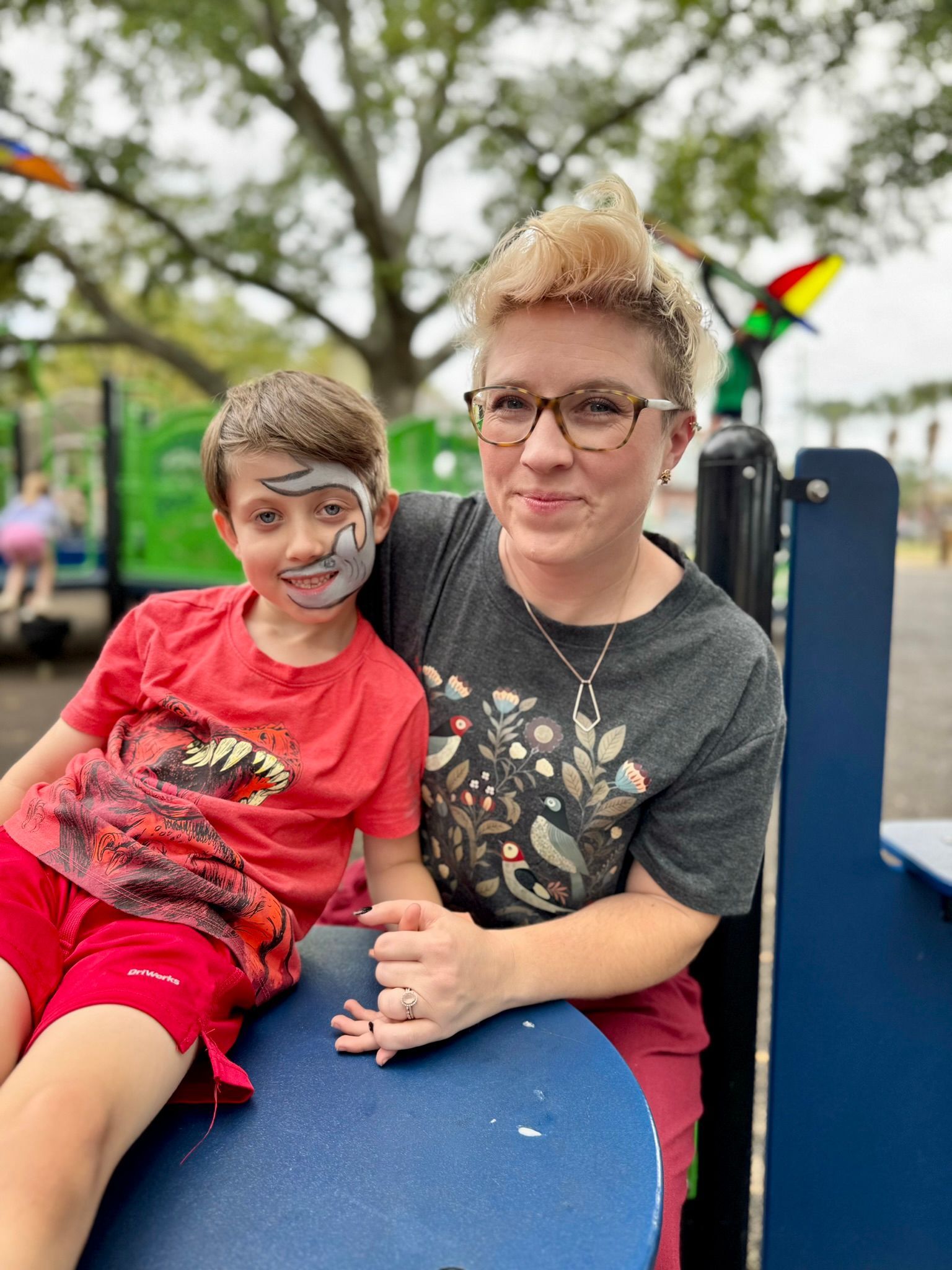Too Many Attention Seekers
You are just one person. So how do you manage when all of the children need your attention at once??

So you've got an attention-seeking child.
And not just one of them! Maybe you have two, three, or six!
They compete for your attention as if their lives depend on it. They clamor at your body while you're cooking, teaching, working, or heaven forbid caring for their own sibling. You've tried to explain to them that there's only one of you, and you're doing the best you can. They need to wait their turn, be a problem-solver, occupy themselves. I totally get it.
And the truth is, you simply can't be fully present for each child every time they want you to. This does not make you a bad mom. And your children WILL be okay even if they aren't in constant connection with you.
But how do we deal with this? How do we teach them to be secure in our connection with them? How do we remind them that even when our attention is elsewhere, that they are safely tethered to us with soul connection, and they need not be afraid of that tether breaking? And how do we reconnect after connection has been lost to show that we will always restore the bond?
This is not a unique experience in the fact that every parent is going to go through this with their children. What is unique is that these are YOUR children. So this is not a how-to post. I cannot give you a step-by-step for managing connection, because there isn't one! Sure there are tips and tricks, but every child is different and every family is working with different means, time, and resources.
So I'm going to share my experience with you to give you a perspective and a new insight on managing the attention-seekers in your home.
And from here to the end, I will be intentionally phrase swapping to "connection-seeking," because that's really what children desire. Heck, they come out of the womb knowing that connection with their caregiver is their only means of survival. Also, to see the positive attributes of our children, connection-seeking applies a lens of understanding our children's best intentions and reduces any malicious intent that we accidentally assign our kids when we say "they just want attention."
Let me share with you about two extremely needy children that I had in my autism classroom. I'll set the stage. These two boys were about 8 and 9 years old, both verbal, funny, kind, and chatty. They loved an audience, and more specifically they loved me. The classroom had about 10 students on most days, and only one me. Granted I had a teacher's aide, which I suppose is akin to having a co-parent that is sometimes available and can sometimes lend a hand. Helpful? Yes. Enough? Never. At least not for the kids.
I'll call the 8 year old Leo, and the 9 year old Michael to preserve their privacy.
When I was teaching a lesson, they wanted to be the only ones I called on. When I led a small group, they would interrupt, wander by my table, and refuse to complete tasks without my direct supervision or support. They would get jealous of each other during breakfast and lunch because they both wanted to sit with me and be the only one talking to me. If another student was having big emotions and needed me for regulation, then Michael would quickly create a problem for himself so that I could come regulate with him and give him my undivided attention. Leo would take every transition throughout the day to talk to me, and honestly I just couldn't handle that many words and that much input. He would even spend recess talking to me, and I needed those precious minutes to restore myself. The environment was already overstimulating, and there was only one of me. And as much as I adored both of these boys, it was unfair for the others and for me when Leo and Michael would monopolize my time.
I'll restrain myself from getting into every crevice of this story... so just know that this takes place from about September to January/February before Leo and Michael are functioning independently in the classroom and using their tools (that I taught them for months) to regulate themselves AND remain secure in our connection.
For Leo, it was easier. He needed boundaries, clear parameters in which to operate and get his needs met without interfering with other students or with my task at hand. And I knew that by resorting to phrases such as "You can't just talk to me the whole time" or "I'm only one teacher, you have to let others have access to me" or "I don't want to hear your story, now isn't the time" only made him feel less important and dismissed the needs
he perceived that he needed met. So I had to do something else. I determined times throughout the day that I would be willing to give to Leo to talk about whatever was on his mind, and I also outlined times in the day that I was unavailable for chit-chat. The times available ranged from 2 minutes to 10 minutes and I would literally sit at my table and listen to him for the full amount of time. I didn't steer his conversations, I asked follow-up questions, and practiced active listening.
Doing this for Leo would fill his cup until the next time he needed to reconnect. He just wanted someone listening to him. Something thinking he was cool, or kind, or fun. And he wanted his audience to care about what he had to say. And to be honest, I couldn't care when other kids are loosing their sh*t and I've got to BE THE TEACHER. So I would tell him, I want to give you this level of attention, and I can't when I'm dealing with xyz. And here's how we can guarantee that I can give you this level attention and connection so that we both get what we need. I even had a pink loop, you know, the noise-reducing ear buds? And I would put it in my left ear (which was the ear facing Leo when I was teaching). It was a symbol that I was unavailable for him at that moment because, being a child, he frequently forgot when I was available for the chit chat and when I wasn't. So this was an easy method for me to just point to my ear, give him a wink, and that would remind him "Don't worry, our time together is coming."
For Michael, whew. His intervention was much more involved and it was a doozy getting him from baseline to the AMAZING progress he had by early springtime. Michael less wanted to chat with me, and more-so wanted my physical affection and for no one else to have my attention than him. He would get incredibly jealous, like being seen by me or interacting with me was a competition against the other students. This would cause huge tantrums and giant pout-fests that would hold for most of the day. There were times he had to be removed from the classroom because of the incredible disruption it would cause. Once I was able to get his needs met, it literally never happened again with me for the rest of the year!!!
This kid needed to know that I loved him all day. He needed to feel connected with me even when he was only across the room from me. He needed to learn how to express his jealousy without derailing the school day.
So, here's what I did. I started REALLY slow. I set this kid a timer that sat on his desk that went off every 5 minutes. And every 5 minutes, no matter what I was doing, he was to come up and get a hug, or shoulder squeeze and some intentional eye contact whether I was teaching whole group, small group, or we were doing independent work. What this method did for him was let him know that he had GUARANTEED connection on the way. That he wasn't going to miss it, or have to wait for it, or for me to accidentally give it away to someone else. It was dependable, reliable, and consistent. But gosh, every 5 minutes? That means I was having a personalized interaction with him upwards of 60 times a day. Don't forget, I'm doing this WHILE teaching 9 other special needs students, managing Leo's connection needs, and all the other wild personalities in that room.
I'M NOT SAYING YOU HAVE TO DO THIS! Ha, I barely remember how I managed! But I certainly didn't keep it at 5 minutes for long. I believe it was only about 3-4 days, and then I bumped it up t0 7, 10, 12, 15, 20, 25, 30 and so on. But the point with the 5 minutes was for him to realize that I was trustworthy, that I was going to honor the agreement no matter what. That he could count on me. Once he knew I was dependable, his anxiety about when our next connection time would be went way down. He certainly looked forward to our time together (and honestly the longest time was probably 30 seconds). So while it took planning and dedication on my part, it was something I could implement with fidelity easily enough. I taught him to stick a post-it note to the top of his desk if he felt like he needed support before his time came. He took advantage of this only a handful of times and then never used it again!
Along with teaching him skills to deal with his jealousy and anger, and providing him with Michael-specific outlets to engage in at his desk when he was feeling in need, I simply became a reliable adult. And all these little check-ins for him acted as preventative care. Because his cup was getting filled regularly, he didn't need to resort to harmful or disruptive behaviors to get his needs met.
You might be thinking, "Well that's impractical. He can't just have your attention all the time forever." And I agree! First, I'll remind you that he was one of 10 students, and when you want behavior to change, you have to invest your time in it up front. It's hard, it's time-consuming, and you must get creative. I also know that it is an adults responsibility to meet a child's needs and to teach the child how to get their needs met appropriately until they are able to do so themselves.
It wasn't long before Michael was going over an hour without needing my connection and sometimes he would even say "I don't need any right now" after his timer would go off! WHAT!!! All that time I put in up front, I was getting back in the end.
So, yeah. The effort was totally worth it. And he had regulation strategies he loved, but smelling a candle was his favorite and picking at his wax ball was a close second. These options helped soothe his nervous system and help channel his anxiety into something safe and feel-good at the same time.
So back to the original questions...
But how do we deal with this?
Uniquely. Not with a cookie-cutter approach. When you work with me, you are guaranteed to achieve solutions that work for you and your children because they are tailor-made for you based on your needs, your time, and your capacity to manage! We create boundaries, ones that are reasonable and do-able for you and your kiddos. Boundaries that preserve your sanity so that you can meet the needs of multiple children.
How do we teach them to be secure in our connection with them? We become dependable. We show up. We hold our word and follow through on our promises. We increase our own ability to safely attach, which you learn in depth when you work with me.
How do we remind them that even when our attention is elsewhere, that they are safely tethered to us with soul connection, and they need not be afraid of that tether breaking? We make special relationships with our children, and no one else has with them what we have with them. And we show them that!
And how do we reconnect after connection has been lost to show that we will always restore the bond? After rupture- because we aren't perfect- we repair. We will let our children down. And I have a whole segment on rupture and repair when we work together so that even when connection has been lost, it is quickly and strongly restored.
If you're ready to learn more, come visit my Work With Me page to learn about my two offers that are specially designed to help you understand your child's behavior, its causes, and how to address it.
Imagine being able to navigate 2, 3, or more children that all desire your attention at the same time and being able to not only manage it, but keep your mind preserved while you do. You can learn how to set your boundaries around your time and attention WHILE deepening a secure attachment in your children so that they don't have to rely on those more inconvenient and sometimes extreme methods of demanding your attention.
Additionally, imagine being OKAY with your children being needy in the first place! Is that such a thing?? We are often triggered by our children's needs because we weren't allowed to express those same needs when we were children. And believe me, we can heal that too!
Best wishes, and go connect!
Amy






